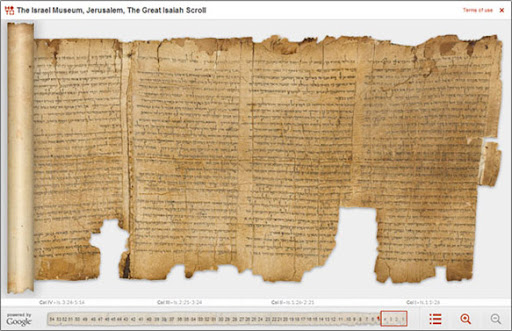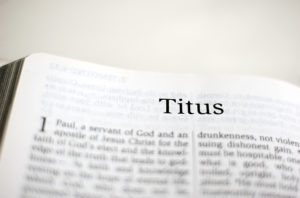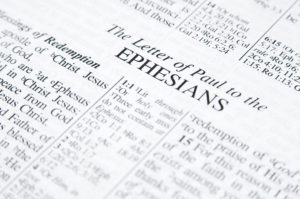Shown below are some scriptures that are used to prove Jesus Christ is Almighty God. Let’s carefully examine these in the light of the scriptures.
Isaiah 9:6 – “Mighty God”. Notice that the scripture doesn’t call him “Almighty God”. It calls him “Mighty God”. Jesus is powerful, but not all-powerful. Almighty God told Moses, “See, I have made you as God to Pharaoh” (Exodus 7:1 NKJV). The verse also predicts: “For to us a child is born, to us a son is given”. “Child” and “son”cannot apply to Almighty God because “God is spirit” (John 4:24), and “God is not human” (Numbers 23:19 NIV).
John 1:1 – “In the beginning was the Word, and the Word was with God, and the Word was God” (NAB). “Was God: lack of a definite article with ‘God’ in Greek signifies predication rather than identification” (NAB note on John 1:1). That means that “was God” is a predicate description about Jesus, but does not identify him as Almighty God. Other translations render it as:—“what God was, the Word was” – REB ; “The Word was divine” – AAT; Moffat. Jesus admitted, “I have come here from God” (John 8:42 NIV), so he couldn’t be Almighty God.
John 1:14 – Jesus “became flesh,” so Trinitarians call him “God-man.” But consider, thousands of people saw Jesus, and, “God is not human” (Numbers 23:19 NIV). In fact, Jesus said: “God is spirit” (John 4:24).
John 1:18 – “No one has seen God at any time” ( NASB). Obviously, Jesus wasn’t, and couldn’t be, God Almighty, since, “No one has ever seen God” (1 John 4:12 NIV).
Romans 9:5 – “the Messiah, who is God over all” (NIV). However, “Paul’s point is that God when is over all aimed to use Israel, which had been entrusted with every privilege, in outreach to the entire world through the Messiah” (NAB note). Notice how this verse can be accurately translated: “theirs the patriarchs, and from them, according to the flesh, the Messiah. God who is over all be blessed forever” (NAB). “from them by natural descent came the Messiah. May God, supreme over all be blessed.” – REB – This verse is also incorrectly translated in some other translations to make it appear that Jesus, the Messiah, is God. The way many translations render this verse, “the Messiah, who is God over all,” contradicts the Trinity doctrine itself. “In this Trinity . . . None is greater, or less, than another. But the whole three Persons are . . . coequal” (Athanasian Creed). The accurate rendering of Romans 9:5, “the Messiah. God who is over all,” harmonizes with other scriptures, such as: “One God and Father of all, who is over all” (Ephesians 4:6).
Colossians 2:9 – “In him, in bodily form, lives divinity (not God) in all its fullness” – NJB; see also CSB; NAB. “And in Christ you have been brought to =&0=&If having God’s fullness made one God, then Christians would be God also, because they “have been brought to fullness.”.
Colossians 1:19 – “because God wanted all fullness to be found in him” (NJB; others). It was God’s decision and action that caused his “fullness” to be in Jesus.
Colossians 3:1 – “Christ is seated at the right hand of God” (NAB). Obviously, Christ is not God, but is at “his right hand”.
2 Peter 1:1 – ” . . . the righteousness of God and our Saviour Jesus Christ” (KJV). “Symeon Peter, a slave and apostle of Jesus Christ, to those who have received a faith of equal value to ours through the righteousness of our God and the savior Jesus Christ” (NAB margin). ” . . . through the righteousness of our God and the Savior Jesus Christ” (NRSV margin). ” . . . given through the saving justice of our God and of the Savior Jesus Christ” (NJB margin). (This verse is translated differently in many translations, making it appear that Jesus Christ is Almighty God). ” . . . of our God, and the savior, Jesus Christ” (Concordant Literal Translation). ” . . . of our God, and savior Jesus Christ” (Phillips). ” . . . of our God, and savior Jesus Christ” (Weymouth). That two different individuals are referred to is made clear by these accurate translations, as well as the very next verse:
2 Peter 1:2 – “the knowledge of God and of Jesus our Lord” – God and Jesus are different individuals, separate and distinct.
Matthew 1:23 – “they will call Immanuel, a name which means ‘God-is-with-us.'” – NJB. Twice in context, we’re told his name is Jesus (1:21,25; 2:1) – Does not mean Jesus is God. See the list of Hebrew names that incorporate God’s name (i.e. Jehu means “Yahweh is He” (2 Kings 9:2)), in the article on this website entitled, “Is Jesus Christ Almighty God?—Matthew”.
Luke 1:31,32,35 – “You shall name him Jesus. He will be great and will be called Son of the Most High . . . the child to be born will be called holy, the Son of God” (NAB) – This is who the angel said he was, not God. “Son of the Most High” means that Jesus is not “the Most High,” but is his “Son.” “The Son of God” is certainly not God Almighty. In the Bible, Jesus is never called “God the Son,” an unscriptural term that Trinitarians like to use.
Hebrews 1:3 – “The Son is the radiance of God’s glory and the exact representation of his being” (NIV). “Radiance” and “representation” are terms that indicate that Jesus is not God, but that he is like God. “He is the reflection of God’s glory.” NJB – Obviously, he couldn’t be God. An image in a mirror is not the same as the original, not even equal to it..
Hebrews 1:8 – “But of the Son he says, ‘God is your throne forever and ever'” (NRSV margin). “God is your throne.” – AAT; Moffat. (translation issue, with many translations rendering the verse: “Your throne, O God,” making it appear that Jesus is God). This verse quotes Psalm 45:6, which can be accurately rendered, “Your throne is from God” (NJB).
Matthew 8:29; Luke 4:34,41 – Demons acknowledged Jesus was “the Son of God” or “the Holy One of God”, but never said that Jesus was God Himself.
Mark 14:61-64 – Saying he is “the Christ, the Son of the Blessed One…the Son of Man sitting at the right hand of the Mighty One,” obviously means he is a different person than his Father, since the Son is different from the Father, and sitting at the right hand of God sets him apart from God also.
Daniel 7:13,14 NASB- Referencing Jesus as the “Son of Man” who “approached the Ancient of Days” and “was given authority…so that all people would obey him” also means he is not the Ancient of Days, not “God”, who is “from eternity” (Psalm 90:2 NJB), not “Yahweh”, who “never dies” (Habakkuk 1:12 NJB), but he is the Son.
John 8:58 – “Before Abraham was born, I am,” is not even good English, it’s in the wrong tense of the verb, because it is wrongly translated. Nevertheless, Trinitarians often use this verse to “prove” Jesus is God by connecting this “I am” to the “I Am” of Exodus 3:14. A better translation of John 8:58 is: “before Abraham was even born, I have always been alive” (NLT margin). This shows that the issue was Jesus’ age, not his identity. It should more accurately rendered: “I existed before Abraham was born” – AAT; Moffat.; CBW.
John 17:5 – “Father, glorify me in your presence with the glory I had with you before the world began.” – NIV ftn. – Obviously an inferior [Jesus] speaking to a superior [God].
Revelation 1:17-18 – “I am the First and the Last. I am the Living One; I was dead.” This Jesus could not be God since Habakkuk 1:12 says God “will never die.”
John 10:11 – “I am the good shepherd,” does not make Jesus God, since the context says:
John 10:15 – “The Father knows me”
John 10:17 – “my Father loves me”
John 10:18 – “This command I received from my Father.”
John 10:36 – “I am the Son of God”. Jesus was accused of ‘making himself God’ (John 10:33), and his refutation of that here in verse 36 is clear proof that Jesus did not claim to be God.
Obviously there are two people here in these scriptures. Jesus was with the Father (John 1:2), who is superior, prior to coming to earth, and who cannot die (Habakkuk 1:12), whereas Jesus died (1 Corinthians 15:3), and “was dead” (Revelation 1:18) for a time. So there is a distinct difference between them.
Matthew 25:31-33 – Yes, the Son of Man, not the Ancient of Days, will do the judging. Why?
John 5:27 – Because the Father has given the Son of Man, Jesus, authority to do the judging.
John 8:12 read more
 “A cornerstone belief of the Christian faith, the doctrine of the Trinity . . . What is the doctrine of the Trinity? . . . There is only one God, but in the unity of the Godhead there are three eternal, coequal Persons where each Person is independently conscious and self-directing but never acting independently of one another and always manifesting the same character attributes and the same nature. Where in the Bible is the Trinity taught? . . . It is taught in 25 of the 27 books of the New Testament and in 13 of the 39 books of the Old Testament”—“Does the Book of Isaiah Teach the Trinity?”, Reasons to Believe (RTB) blogsite, by Hugh Ross, July 20, 2020
“A cornerstone belief of the Christian faith, the doctrine of the Trinity . . . What is the doctrine of the Trinity? . . . There is only one God, but in the unity of the Godhead there are three eternal, coequal Persons where each Person is independently conscious and self-directing but never acting independently of one another and always manifesting the same character attributes and the same nature. Where in the Bible is the Trinity taught? . . . It is taught in 25 of the 27 books of the New Testament and in 13 of the 39 books of the Old Testament”—“Does the Book of Isaiah Teach the Trinity?”, Reasons to Believe (RTB) blogsite, by Hugh Ross, July 20, 2020



 “It is God who judges”—
“It is God who judges”—